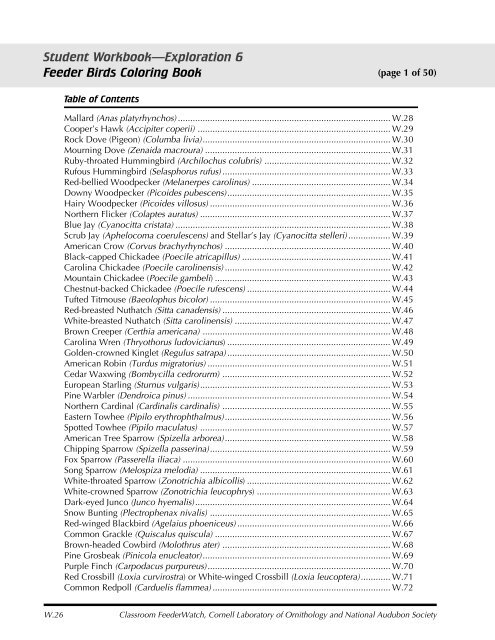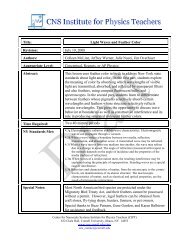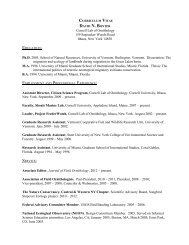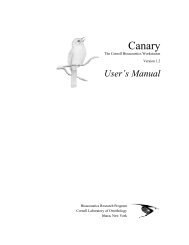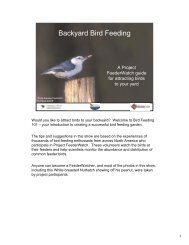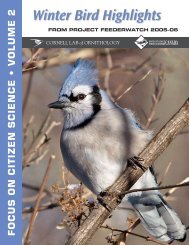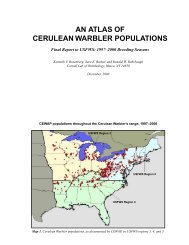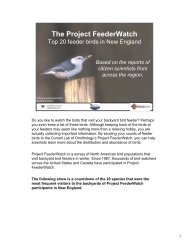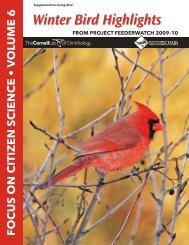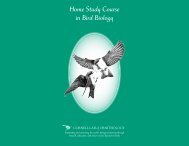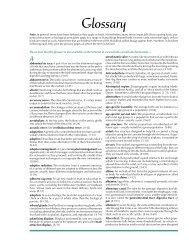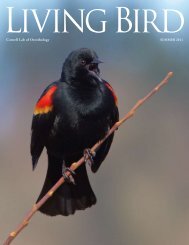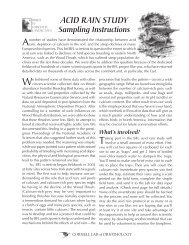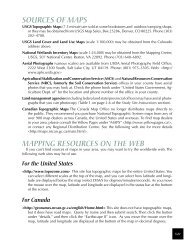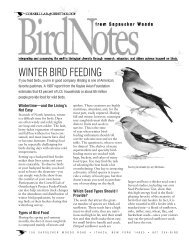Feeder Birds Coloring Book - Cornell Lab of Ornithology
Feeder Birds Coloring Book - Cornell Lab of Ornithology
Feeder Birds Coloring Book - Cornell Lab of Ornithology
You also want an ePaper? Increase the reach of your titles
YUMPU automatically turns print PDFs into web optimized ePapers that Google loves.
Student Workbook—Exploration 6<br />
<strong>Feeder</strong> <strong>Birds</strong> <strong>Coloring</strong> <strong>Book</strong><br />
(page 1 <strong>of</strong> 50)<br />
Table <strong>of</strong> Contents<br />
Mallard (Anas platyrhynchos) ...................................................................................... W.28<br />
Cooper’s Hawk (Accipiter coperii) .............................................................................. W.29<br />
Rock Dove (Pigeon) (Columba livia)............................................................................ W.30<br />
Mourning Dove (Zenaida macroura) ........................................................................... W.31<br />
Ruby-throated Hummingbird (Archilochus colubris) ................................................... W.32<br />
Rufous Hummingbird (Selasphorus rufus) .................................................................... W.33<br />
Red-bellied Woodpecker (Melanerpes carolinus) ........................................................ W.34<br />
Downy Woodpecker (Picoides pubescens).................................................................. W.35<br />
Hairy Woodpecker (Picoides villosus) ......................................................................... W.36<br />
Northern Flicker (Colaptes auratus) ............................................................................. W.37<br />
Blue Jay (Cyanocitta cristata) ....................................................................................... W.38<br />
Scrub Jay (Aphelocoma coerulescens) and Stellar’s Jay (Cyanocitta stelleri) ................. W.39<br />
American Crow (Corvus brachyrhynchos) ................................................................... W.40<br />
Black-capped Chickadee (Poecile atricapillus) ............................................................ W.41<br />
Carolina Chickadee (Poecile carolinensis) ................................................................... W.42<br />
Mountain Chickadee (Poecile gambeli) ....................................................................... W.43<br />
Chestnut-backed Chickadee (Poecile rufescens) .......................................................... W.44<br />
Tufted Titmouse (Baeolophus bicolor) ......................................................................... W.45<br />
Red-breasted Nuthatch (Sitta canadensis) .................................................................... W.46<br />
White-breasted Nuthatch (Sitta carolinensis) ............................................................... W.47<br />
Brown Creeper (Certhia americana) ............................................................................ W.48<br />
Carolina Wren (Thryothorus ludovicianus) .................................................................. W.49<br />
Golden-crowned Kinglet (Regulus satrapa) .................................................................. W.50<br />
American Robin (Turdus migratorius) .......................................................................... W.51<br />
Cedar Waxwing (Bombycilla cedrorurm) .................................................................... W.52<br />
European Starling (Sturnus vulgaris)............................................................................. W.53<br />
Pine Warbler (Dendroica pinus) .................................................................................. W.54<br />
Northern Cardinal (Cardinalis cardinalis) .................................................................... W.55<br />
Eastern Towhee (Pipilo erythrophthalmus)................................................................... W.56<br />
Spotted Towhee (Pipilo maculatus) ............................................................................. W.57<br />
American Tree Sparrow (Spizella arborea)................................................................... W.58<br />
Chipping Sparrow (Spizella passerina)......................................................................... W.59<br />
Fox Sparrow (Passerella iliaca) .................................................................................... W.60<br />
Song Sparrow (Melospiza melodia) ............................................................................. W.61<br />
White-throated Sparrow (Zonotrichia albicollis) .......................................................... W.62<br />
White-crowned Sparrow (Zonotrichia leucophrys) ...................................................... W.63<br />
Dark-eyed Junco (Junco hyemalis)............................................................................... W.64<br />
Snow Bunting (Plectrophenax nivalis) ......................................................................... W.65<br />
Red-winged Blackbird (Agelaius phoeniceus) .............................................................. W.66<br />
Common Grackle (Quiscalus quiscula) ....................................................................... W.67<br />
Brown-headed Cowbird (Molothrus ater) .................................................................... W.68<br />
Pine Grosbeak (Pinicola enucleator)............................................................................ W.69<br />
Purple Finch (Carpodacus purpureus).......................................................................... W.70<br />
Red Crossbill (Loxia curvirostra) or White-winged Crossbill (Loxia leucoptera)............ W.71<br />
Common Redpoll (Carduelis flammea) ........................................................................ W.72<br />
W.26 Classroom <strong>Feeder</strong>Watch, <strong>Cornell</strong> <strong>Lab</strong>oratory <strong>of</strong> <strong>Ornithology</strong> and National Audubon Society
Student Workbook—Exploration 6<br />
<strong>Feeder</strong> <strong>Birds</strong> <strong>Coloring</strong> <strong>Book</strong> (page 2 <strong>of</strong> 50)<br />
Table <strong>of</strong> Contents (continued)<br />
Pine Siskin (Carduelis pinus) ....................................................................................... W.73<br />
American Goldfinch (Carduelis tristis) ......................................................................... W.74<br />
House Sparrow (Passer domesticus) ............................................................................ W.75<br />
This coloring book contains black line drawings <strong>of</strong> many <strong>of</strong> the common feeder birds found on<br />
our Common <strong>Feeder</strong> <strong>Birds</strong> posters and in the slide sets included in the CFW curriculum. Both eastern<br />
and western species are represented.<br />
Most <strong>of</strong> the pictures in this coloring book were drawn by the noted bird artist and ornithologist,<br />
Louis Agassiz Fuertes (1872–1927). Fuertes, a native <strong>of</strong> Ithaca, New York, and a <strong>Cornell</strong> University<br />
graduate, is know for his realistic bird art. Look for his signature initials: L.A.F. The other drawings are<br />
by William Motagna, signature initials: W.M.<br />
These drawings are reprinted with the generous permission <strong>of</strong> the publisher, Comstock Publishing<br />
Company, Inc., Ithaca, New York.<br />
Classroom <strong>Feeder</strong>Watch, <strong>Cornell</strong> <strong>Lab</strong>oratory <strong>of</strong> <strong>Ornithology</strong> and National Audubon Society W.27
Student Workbook—Exploration 6<br />
<strong>Feeder</strong> <strong>Birds</strong> <strong>Coloring</strong> <strong>Book</strong><br />
Mallard (Anas platyrhynchos)<br />
What color is it?<br />
Describe its shape.<br />
What are its field marks?<br />
How big is it? (Compare its size to that <strong>of</strong> a crow, a robin, or a sparrow.)<br />
Do males and females look different? If so, how are they different?<br />
Did you color a male or a female?<br />
W.28 Classroom <strong>Feeder</strong>Watch, <strong>Cornell</strong> <strong>Lab</strong>oratory <strong>of</strong> <strong>Ornithology</strong> and National Audubon Society
Student Workbook—Exploration 6<br />
<strong>Feeder</strong> <strong>Birds</strong> <strong>Coloring</strong> <strong>Book</strong><br />
Cooper’s Hawk (Accipiter cooperii)<br />
What color is it?<br />
Describe its shape.<br />
What are its field marks?<br />
How big is it? (Compare its size to that <strong>of</strong> a crow, a robin, or a sparrow.)<br />
Do males and females look different? If so, how are they different?<br />
Did you color a male or a female?<br />
Classroom <strong>Feeder</strong>Watch, <strong>Cornell</strong> <strong>Lab</strong>oratory <strong>of</strong> <strong>Ornithology</strong> and National Audubon Society W.29
Student Workbook—Exploration 6<br />
<strong>Feeder</strong> <strong>Birds</strong> <strong>Coloring</strong> <strong>Book</strong><br />
Rock Dove (Columba livia)<br />
What color is it?<br />
Describe its shape.<br />
What are its field marks?<br />
How big is it? (Compare its size to that <strong>of</strong> a crow, a robin, or a sparrow.)<br />
Do males and females look different? If so, how are they different?<br />
Did you color a male or a female?<br />
W.30 Classroom <strong>Feeder</strong>Watch, <strong>Cornell</strong> <strong>Lab</strong>oratory <strong>of</strong> <strong>Ornithology</strong> and National Audubon Society
Student Workbook—Exploration 6<br />
<strong>Feeder</strong> <strong>Birds</strong> <strong>Coloring</strong> <strong>Book</strong><br />
Mourning Dove (Zenaida macroura)<br />
What color is it?<br />
Describe its shape.<br />
What are its field marks?<br />
How big is it? (Compare its size to that <strong>of</strong> a crow, a robin, or a sparrow.)<br />
Do males and females look different? If so, how are they different?<br />
Did you color a male or a female?<br />
Classroom <strong>Feeder</strong>Watch, <strong>Cornell</strong> <strong>Lab</strong>oratory <strong>of</strong> <strong>Ornithology</strong> and National Audubon Society W.31
Student Workbook—Exploration 6<br />
<strong>Feeder</strong> <strong>Birds</strong> <strong>Coloring</strong> <strong>Book</strong><br />
Ruby-throated Hummingbird (Archilochus colubris)<br />
What color is it?<br />
Describe its shape.<br />
What are its field marks?<br />
How big is it? (Compare its size to that <strong>of</strong> a crow, a robin, or a sparrow.)<br />
Do males and females look different? If so, how are they different?<br />
Did you color a male or a female?<br />
W.32 Classroom <strong>Feeder</strong>Watch, <strong>Cornell</strong> <strong>Lab</strong>oratory <strong>of</strong> <strong>Ornithology</strong> and National Audubon Society
Student Workbook—Exploration 6<br />
<strong>Feeder</strong> <strong>Birds</strong> <strong>Coloring</strong> <strong>Book</strong><br />
Rufous Hummingbird (Selasphorus rufus)<br />
What color is it?<br />
Describe its shape.<br />
What are its field marks?<br />
How big is it? (Compare its size to that <strong>of</strong> a crow, a robin, or a sparrow.)<br />
Do males and females look different? If so, how are they different?<br />
Did you color a male or a female?<br />
Classroom <strong>Feeder</strong>Watch, <strong>Cornell</strong> <strong>Lab</strong>oratory <strong>of</strong> <strong>Ornithology</strong> and National Audubon Society W.33
Student Workbook—Exploration 6<br />
<strong>Feeder</strong> <strong>Birds</strong> <strong>Coloring</strong> <strong>Book</strong><br />
Red-bellied Woodpecker (Melanerpes carolinus)<br />
What color is it?<br />
Describe its shape.<br />
What are its field marks?<br />
How big is it? (Compare its size to that <strong>of</strong> a crow, a robin, or a sparrow.)<br />
Do males and females look different? If so, how are they different?<br />
Did you color a male or a female?<br />
W.34 Classroom <strong>Feeder</strong>Watch, <strong>Cornell</strong> <strong>Lab</strong>oratory <strong>of</strong> <strong>Ornithology</strong> and National Audubon Society
Student Workbook—Exploration 6<br />
<strong>Feeder</strong> <strong>Birds</strong> <strong>Coloring</strong> <strong>Book</strong><br />
Downy Woodpecker (Picoides pubescens)<br />
What color is it?<br />
Describe its shape.<br />
What are its field marks?<br />
How big is it? (Compare its size to that <strong>of</strong> a crow, a robin, or a sparrow.)<br />
Do males and females look different? If so, how are they different?<br />
Did you color a male or a female?<br />
Classroom <strong>Feeder</strong>Watch, <strong>Cornell</strong> <strong>Lab</strong>oratory <strong>of</strong> <strong>Ornithology</strong> and National Audubon Society W.35
Student Workbook—Exploration 6<br />
<strong>Feeder</strong> <strong>Birds</strong> <strong>Coloring</strong> <strong>Book</strong><br />
Hairy Woodpecker (Picoides villosus)<br />
What color is it?<br />
Describe its shape.<br />
What are its field marks?<br />
How big is it? (Compare its size to that <strong>of</strong> a crow, a robin, or a sparrow.)<br />
Do males and females look different? If so, how are they different?<br />
Did you color a male or a female?<br />
W.36 Classroom <strong>Feeder</strong>Watch, <strong>Cornell</strong> <strong>Lab</strong>oratory <strong>of</strong> <strong>Ornithology</strong> and National Audubon Society
Student Workbook—Exploration 6<br />
<strong>Feeder</strong> <strong>Birds</strong> <strong>Coloring</strong> <strong>Book</strong><br />
Northern Flicker (Colaptes auratus)<br />
What color is it?<br />
Describe its shape.<br />
What are its field marks?<br />
How big is it? (Compare its size to that <strong>of</strong> a crow, a robin, or a sparrow.)<br />
Do males and females look different? If so, how are they different?<br />
Did you color a male or a female?<br />
Classroom <strong>Feeder</strong>Watch, <strong>Cornell</strong> <strong>Lab</strong>oratory <strong>of</strong> <strong>Ornithology</strong> and National Audubon Society W.37
Student Workbook—Exploration 6<br />
<strong>Feeder</strong> <strong>Birds</strong> <strong>Coloring</strong> <strong>Book</strong><br />
Blue Jay (Cyanocitta cristata)<br />
What color is it?<br />
Describe its shape.<br />
What are its field marks?<br />
How big is it? (Compare its size to that <strong>of</strong> a crow, a robin, or a sparrow.)<br />
Do males and females look different? If so, how are they different?<br />
Did you color a male or a female?<br />
W.38 Classroom <strong>Feeder</strong>Watch, <strong>Cornell</strong> <strong>Lab</strong>oratory <strong>of</strong> <strong>Ornithology</strong> and National Audubon Society
Student Workbook—Exploration 6<br />
<strong>Feeder</strong> <strong>Birds</strong> <strong>Coloring</strong> <strong>Book</strong><br />
Scrub Jay (Aphelocoma coerulescens) and Stellar’s Jay (Cyanocitta stelleri)<br />
What color is it?<br />
Describe its shape.<br />
What are its field marks?<br />
How big is it? (Compare its size to that <strong>of</strong> a crow, a robin, or a sparrow.)<br />
Do males and females look different? If so, how are they different?<br />
Did you color a male or a female?<br />
Classroom <strong>Feeder</strong>Watch, <strong>Cornell</strong> <strong>Lab</strong>oratory <strong>of</strong> <strong>Ornithology</strong> and National Audubon Society W.39
Student Workbook—Exploration 6<br />
<strong>Feeder</strong> <strong>Birds</strong> <strong>Coloring</strong> <strong>Book</strong><br />
American Crow (Corvus brachrynchos)<br />
What color is it?<br />
Describe its shape.<br />
What are its field marks?<br />
How big is it? (Compare its size to that <strong>of</strong> a crow, a robin, or a sparrow.)<br />
Do males and females look different? If so, how are they different?<br />
Did you color a male or a female?<br />
W.40 Classroom <strong>Feeder</strong>Watch, <strong>Cornell</strong> <strong>Lab</strong>oratory <strong>of</strong> <strong>Ornithology</strong> and National Audubon Society
Student Workbook—Exploration 6<br />
<strong>Feeder</strong> <strong>Birds</strong> <strong>Coloring</strong> <strong>Book</strong><br />
Black-capped Chickadee (Poecile atricapillus)<br />
What color is it?<br />
Describe its shape.<br />
What are its field marks?<br />
How big is it? (Compare its size to that <strong>of</strong> a crow, a robin, or a sparrow.)<br />
Do males and females look different? If so, how are they different?<br />
Did you color a male or a female?<br />
Classroom <strong>Feeder</strong>Watch, <strong>Cornell</strong> <strong>Lab</strong>oratory <strong>of</strong> <strong>Ornithology</strong> and National Audubon Society W.41
Student Workbook—Exploration 6<br />
<strong>Feeder</strong> <strong>Birds</strong> <strong>Coloring</strong> <strong>Book</strong><br />
Carolina Chickadee (Poecile carolinensis)<br />
What color is it?<br />
Describe its shape.<br />
What are its field marks?<br />
How big is it? (Compare its size to that <strong>of</strong> a crow, a robin, or a sparrow.)<br />
Do males and females look different? If so, how are they different?<br />
Did you color a male or a female?<br />
W.42 Classroom <strong>Feeder</strong>Watch, <strong>Cornell</strong> <strong>Lab</strong>oratory <strong>of</strong> <strong>Ornithology</strong> and National Audubon Society
Student Workbook—Exploration 6<br />
<strong>Feeder</strong> <strong>Birds</strong> <strong>Coloring</strong> <strong>Book</strong><br />
Mountain Chickadee (Poecile gambeli)<br />
What color is it?<br />
Describe its shape.<br />
What are its field marks?<br />
How big is it? (Compare its size to that <strong>of</strong> a crow, a robin, or a sparrow.)<br />
Do males and females look different? If so, how are they different?<br />
Did you color a male or a female?<br />
Classroom <strong>Feeder</strong>Watch, <strong>Cornell</strong> <strong>Lab</strong>oratory <strong>of</strong> <strong>Ornithology</strong> and National Audubon Society W.43
Student Workbook—Exploration 6<br />
<strong>Feeder</strong> <strong>Birds</strong> <strong>Coloring</strong> <strong>Book</strong><br />
Chestnut-backed Chickadee (Poecile rufescens)<br />
What color is it?<br />
Describe its shape.<br />
What are its field marks?<br />
How big is it? (Compare its size to that <strong>of</strong> a crow, a robin, or a sparrow.)<br />
Do males and females look different? If so, how are they different?<br />
Did you color a male or a female?<br />
W.44 Classroom <strong>Feeder</strong>Watch, <strong>Cornell</strong> <strong>Lab</strong>oratory <strong>of</strong> <strong>Ornithology</strong> and National Audubon Society
Student Workbook—Exploration 6<br />
<strong>Feeder</strong> <strong>Birds</strong> <strong>Coloring</strong> <strong>Book</strong><br />
Tufted Titmouse (Baolophus bicolor)<br />
What color is it?<br />
Describe its shape.<br />
What are its field marks?<br />
How big is it? (Compare its size to that <strong>of</strong> a crow, a robin, or a sparrow.)<br />
Do males and females look different? If so, how are they different?<br />
Did you color a male or a female?<br />
Classroom <strong>Feeder</strong>Watch, <strong>Cornell</strong> <strong>Lab</strong>oratory <strong>of</strong> <strong>Ornithology</strong> and National Audubon Society W.45
Student Workbook—Exploration 6<br />
<strong>Feeder</strong> <strong>Birds</strong> <strong>Coloring</strong> <strong>Book</strong><br />
Red-breasted Nuthatch (Sitta canadensis)<br />
What color is it?<br />
Describe its shape.<br />
What are its field marks?<br />
How big is it? (Compare its size to that <strong>of</strong> a crow, a robin, or a sparrow.)<br />
Do males and females look different? If so, how are they different?<br />
Did you color a male or a female?<br />
W.46 Classroom <strong>Feeder</strong>Watch, <strong>Cornell</strong> <strong>Lab</strong>oratory <strong>of</strong> <strong>Ornithology</strong> and National Audubon Society
Student Workbook—Exploration 6<br />
<strong>Feeder</strong> <strong>Birds</strong> <strong>Coloring</strong> <strong>Book</strong><br />
White-breasted Nuthatch (Sitta carolinensis)<br />
What color is it?<br />
Describe its shape.<br />
What are its field marks?<br />
How big is it? (Compare its size to that <strong>of</strong> a crow, a robin, or a sparrow.)<br />
Do males and females look different? If so, how are they different?<br />
Did you color a male or a female?<br />
Classroom <strong>Feeder</strong>Watch, <strong>Cornell</strong> <strong>Lab</strong>oratory <strong>of</strong> <strong>Ornithology</strong> and National Audubon Society W.47
Student Workbook—Exploration 6<br />
<strong>Feeder</strong> <strong>Birds</strong> <strong>Coloring</strong> <strong>Book</strong><br />
Brown Creeper (Certhia americana)<br />
What color is it?<br />
Describe its shape.<br />
What are its field marks?<br />
How big is it? (Compare its size to that <strong>of</strong> a crow, a robin, or a sparrow.)<br />
Do males and females look different? If so, how are they different?<br />
Did you color a male or a female?<br />
W.48 Classroom <strong>Feeder</strong>Watch, <strong>Cornell</strong> <strong>Lab</strong>oratory <strong>of</strong> <strong>Ornithology</strong> and National Audubon Society
Student Workbook—Exploration 6<br />
<strong>Feeder</strong> <strong>Birds</strong> <strong>Coloring</strong> <strong>Book</strong><br />
Carolina Wren (Thryothorus ludovicianus)<br />
What color is it?<br />
Describe its shape.<br />
What are its field marks?<br />
How big is it? (Compare its size to that <strong>of</strong> a crow, a robin, or a sparrow.)<br />
Do males and females look different? If so, how are they different?<br />
Did you color a male or a female?<br />
Classroom <strong>Feeder</strong>Watch, <strong>Cornell</strong> <strong>Lab</strong>oratory <strong>of</strong> <strong>Ornithology</strong> and National Audubon Society W.49
Student Workbook—Exploration 6<br />
<strong>Feeder</strong> <strong>Birds</strong> <strong>Coloring</strong> <strong>Book</strong><br />
Golden-crowned Kinglet (Regulus satrapa)<br />
What color is it?<br />
Describe its shape.<br />
What are its field marks?<br />
How big is it? (Compare its size to that <strong>of</strong> a crow, a robin, or a sparrow.)<br />
Do males and females look different? If so, how are they different?<br />
Did you color a male or a female?<br />
W.50 Classroom <strong>Feeder</strong>Watch, <strong>Cornell</strong> <strong>Lab</strong>oratory <strong>of</strong> <strong>Ornithology</strong> and National Audubon Society
Student Workbook—Exploration 6<br />
<strong>Feeder</strong> <strong>Birds</strong> <strong>Coloring</strong> <strong>Book</strong><br />
American Robin (Turdus migratorius)<br />
What color is it?<br />
Describe its shape.<br />
What are its field marks?<br />
How big is it? (Compare its size to that <strong>of</strong> a crow, a robin, or a sparrow.)<br />
Do males and females look different? If so, how are they different?<br />
Did you color a male or a female?<br />
Classroom <strong>Feeder</strong>Watch, <strong>Cornell</strong> <strong>Lab</strong>oratory <strong>of</strong> <strong>Ornithology</strong> and National Audubon Society W.51
Student Workbook—Exploration 6<br />
<strong>Feeder</strong> <strong>Birds</strong> <strong>Coloring</strong> <strong>Book</strong><br />
Cedar Waxwing (Bombycilla cedrorurm)<br />
What color is it?<br />
Describe its shape.<br />
What are its field marks?<br />
How big is it? (Compare its size to that <strong>of</strong> a crow, a robin, or a sparrow.)<br />
Do males and females look different? If so, how are they different?<br />
Did you color a male or a female?<br />
W.52 Classroom <strong>Feeder</strong>Watch, <strong>Cornell</strong> <strong>Lab</strong>oratory <strong>of</strong> <strong>Ornithology</strong> and National Audubon Society
Student Workbook—Exploration 6<br />
<strong>Feeder</strong> <strong>Birds</strong> <strong>Coloring</strong> <strong>Book</strong><br />
European Starling (Sturnus vulgaris)<br />
What color is it?<br />
Describe its shape.<br />
What are its field marks?<br />
How big is it? (Compare its size to that <strong>of</strong> a crow, a robin, or a sparrow.)<br />
Do males and females look different? If so, how are they different?<br />
Did you color a male or a female?<br />
Classroom <strong>Feeder</strong>Watch, <strong>Cornell</strong> <strong>Lab</strong>oratory <strong>of</strong> <strong>Ornithology</strong> and National Audubon Society W.53
Student Workbook—Exploration 6<br />
<strong>Feeder</strong> <strong>Birds</strong> <strong>Coloring</strong> <strong>Book</strong><br />
Pine Warbler (Dendroica pinus)<br />
What color is it?<br />
Describe its shape.<br />
What are its field marks?<br />
How big is it? (Compare its size to that <strong>of</strong> a crow, a robin, or a sparrow.)<br />
Do males and females look different? If so, how are they different?<br />
Did you color a male or a female?<br />
W.54 Classroom <strong>Feeder</strong>Watch, <strong>Cornell</strong> <strong>Lab</strong>oratory <strong>of</strong> <strong>Ornithology</strong> and National Audubon Society
Student Workbook—Exploration 6<br />
<strong>Feeder</strong> <strong>Birds</strong> <strong>Coloring</strong> <strong>Book</strong><br />
Northern Cardinal (Cardinalis cardinalis)<br />
What color is it?<br />
Describe its shape.<br />
What are its field marks?<br />
How big is it? (Compare its size to that <strong>of</strong> a crow, a robin, or a sparrow.)<br />
Do males and females look different? If so, how are they different?<br />
Did you color a male or a female?<br />
Classroom <strong>Feeder</strong>Watch, <strong>Cornell</strong> <strong>Lab</strong>oratory <strong>of</strong> <strong>Ornithology</strong> and National Audubon Society W.55
Student Workbook—Exploration 6<br />
<strong>Feeder</strong> <strong>Birds</strong> <strong>Coloring</strong> <strong>Book</strong><br />
Eastern Towhee (Pipilo erythrophthalmus)<br />
What color is it?<br />
Describe its shape.<br />
What are its field marks?<br />
How big is it? (Compare its size to that <strong>of</strong> a crow, a robin, or a sparrow.)<br />
Do males and females look different? If so, how are they different?<br />
Did you color a male or a female?<br />
W.56 Classroom <strong>Feeder</strong>Watch, <strong>Cornell</strong> <strong>Lab</strong>oratory <strong>of</strong> <strong>Ornithology</strong> and National Audubon Society
Student Workbook—Exploration 6<br />
<strong>Feeder</strong> <strong>Birds</strong> <strong>Coloring</strong> <strong>Book</strong><br />
Spotted Towhee (Pipilo maculatus)<br />
What color is it?<br />
Describe its shape.<br />
What are its field marks?<br />
How big is it? (Compare its size to that <strong>of</strong> a crow, a robin, or a sparrow.)<br />
Do males and females look different? If so, how are they different?<br />
Did you color a male or a female?<br />
Classroom <strong>Feeder</strong>Watch, <strong>Cornell</strong> <strong>Lab</strong>oratory <strong>of</strong> <strong>Ornithology</strong> and National Audubon Society W.57
Student Workbook—Exploration 6<br />
<strong>Feeder</strong> <strong>Birds</strong> <strong>Coloring</strong> <strong>Book</strong><br />
American Tree Sparrow (Spizella arborea)<br />
What color is it?<br />
Describe its shape.<br />
What are its field marks?<br />
How big is it? (Compare its size to that <strong>of</strong> a crow, a robin, or a sparrow.)<br />
Do males and females look different? If so, how are they different?<br />
Did you color a male or a female?<br />
W.58 Classroom <strong>Feeder</strong>Watch, <strong>Cornell</strong> <strong>Lab</strong>oratory <strong>of</strong> <strong>Ornithology</strong> and National Audubon Society
Student Workbook—Exploration 6<br />
<strong>Feeder</strong> <strong>Birds</strong> <strong>Coloring</strong> <strong>Book</strong><br />
Chipping Sparrow (Spizella passerina)<br />
What color is it?<br />
Describe its shape.<br />
What are its field marks?<br />
How big is it? (Compare its size to that <strong>of</strong> a crow, a robin, or a sparrow.)<br />
Do males and females look different? If so, how are they different?<br />
Did you color a male or a female?<br />
Classroom <strong>Feeder</strong>Watch, <strong>Cornell</strong> <strong>Lab</strong>oratory <strong>of</strong> <strong>Ornithology</strong> and National Audubon Society W.59
Student Workbook—Exploration 6<br />
<strong>Feeder</strong> <strong>Birds</strong> <strong>Coloring</strong> <strong>Book</strong><br />
Fox Sparrow (Passerella iliaca)<br />
What color is it?<br />
Describe its shape.<br />
What are its field marks?<br />
How big is it? (Compare its size to that <strong>of</strong> a crow, a robin, or a sparrow.)<br />
Do males and females look different? If so, how are they different?<br />
Did you color a male or a female?<br />
W.60 Classroom <strong>Feeder</strong>Watch, <strong>Cornell</strong> <strong>Lab</strong>oratory <strong>of</strong> <strong>Ornithology</strong> and National Audubon Society
Student Workbook—Exploration 6<br />
<strong>Feeder</strong> <strong>Birds</strong> <strong>Coloring</strong> <strong>Book</strong><br />
Song Sparrow (Melospiza melodia)<br />
What color is it?<br />
Describe its shape.<br />
What are its field marks?<br />
How big is it? (Compare its size to that <strong>of</strong> a crow, a robin, or a sparrow.)<br />
Do males and females look different? If so, how are they different?<br />
Did you color a male or a female?<br />
Classroom <strong>Feeder</strong>Watch, <strong>Cornell</strong> <strong>Lab</strong>oratory <strong>of</strong> <strong>Ornithology</strong> and National Audubon Society W.61
Student Workbook—Exploration 6<br />
<strong>Feeder</strong> <strong>Birds</strong> <strong>Coloring</strong> <strong>Book</strong><br />
White-throated Sparrow (Zonotrichia albicollis)<br />
What color is it?<br />
Describe its shape.<br />
What are its field marks?<br />
How big is it? (Compare its size to that <strong>of</strong> a crow, a robin, or a sparrow.)<br />
Do males and females look different? If so, how are they different?<br />
Did you color a male or a female?<br />
W.62 Classroom <strong>Feeder</strong>Watch, <strong>Cornell</strong> <strong>Lab</strong>oratory <strong>of</strong> <strong>Ornithology</strong> and National Audubon Society
Student Workbook—Exploration 6<br />
<strong>Feeder</strong> <strong>Birds</strong> <strong>Coloring</strong> <strong>Book</strong><br />
White-crowned Sparrow (Zonotrichia leucophrys)<br />
What color is it?<br />
Describe its shape.<br />
What are its field marks?<br />
How big is it? (Compare its size to that <strong>of</strong> a crow, a robin, or a sparrow.)<br />
Do males and females look different? If so, how are they different?<br />
Did you color a male or a female?<br />
Classroom <strong>Feeder</strong>Watch, <strong>Cornell</strong> <strong>Lab</strong>oratory <strong>of</strong> <strong>Ornithology</strong> and National Audubon Society W.63
Student Workbook—Exploration 6<br />
<strong>Feeder</strong> <strong>Birds</strong> <strong>Coloring</strong> <strong>Book</strong><br />
Dark-eyed Junco (Junco hyemalis)<br />
What color is it?<br />
Describe its shape.<br />
What are its field marks?<br />
How big is it? (Compare its size to that <strong>of</strong> a crow, a robin, or a sparrow.)<br />
Do males and females look different? If so, how are they different?<br />
Did you color a male or a female?<br />
W.64 Classroom <strong>Feeder</strong>Watch, <strong>Cornell</strong> <strong>Lab</strong>oratory <strong>of</strong> <strong>Ornithology</strong> and National Audubon Society
Student Workbook—Exploration 6<br />
<strong>Feeder</strong> <strong>Birds</strong> <strong>Coloring</strong> <strong>Book</strong><br />
Snow Bunting (Plectrophenax nivalis)<br />
What color is it?<br />
Describe its shape.<br />
What are its field marks?<br />
How big is it? (Compare its size to that <strong>of</strong> a crow, a robin, or a sparrow.)<br />
Do males and females look different? If so, how are they different?<br />
Did you color a male or a female?<br />
Classroom <strong>Feeder</strong>Watch, <strong>Cornell</strong> <strong>Lab</strong>oratory <strong>of</strong> <strong>Ornithology</strong> and National Audubon Society W.65
Student Workbook—Exploration 6<br />
<strong>Feeder</strong> <strong>Birds</strong> <strong>Coloring</strong> <strong>Book</strong><br />
Red-winged Blackbird (Agelaius phoeniceus)<br />
What color is it?<br />
Describe its shape.<br />
What are its field marks?<br />
How big is it? (Compare its size to that <strong>of</strong> a crow, a robin, or a sparrow.)<br />
Do males and females look different? If so, how are they different?<br />
Did you color a male or a female?<br />
W.66 Classroom <strong>Feeder</strong>Watch, <strong>Cornell</strong> <strong>Lab</strong>oratory <strong>of</strong> <strong>Ornithology</strong> and National Audubon Society
Student Workbook—Exploration 6<br />
<strong>Feeder</strong> <strong>Birds</strong> <strong>Coloring</strong> <strong>Book</strong><br />
Common Grackle (Quiscalus quiscula)<br />
What color is it?<br />
Describe its shape.<br />
What are its field marks?<br />
How big is it? (Compare its size to that <strong>of</strong> a crow, a robin, or a sparrow.)<br />
Do males and females look different? If so, how are they different?<br />
Did you color a male or a female?<br />
Classroom <strong>Feeder</strong>Watch, <strong>Cornell</strong> <strong>Lab</strong>oratory <strong>of</strong> <strong>Ornithology</strong> and National Audubon Society W.67
Student Workbook—Exploration 6<br />
<strong>Feeder</strong> <strong>Birds</strong> <strong>Coloring</strong> <strong>Book</strong><br />
Brown-headed Cowbird (Molothrus ater)<br />
What color is it?<br />
Describe its shape.<br />
What are its field marks?<br />
How big is it? (Compare its size to that <strong>of</strong> a crow, a robin, or a sparrow.)<br />
Do males and females look different? If so, how are they different?<br />
Did you color a male or a female?<br />
W.68 Classroom <strong>Feeder</strong>Watch, <strong>Cornell</strong> <strong>Lab</strong>oratory <strong>of</strong> <strong>Ornithology</strong> and National Audubon Society
Student Workbook—Exploration 6<br />
<strong>Feeder</strong> <strong>Birds</strong> <strong>Coloring</strong> <strong>Book</strong><br />
Pine Grosbeak (Pinicola enucleator)<br />
What color is it?<br />
Describe its shape.<br />
What are its field marks?<br />
How big is it? (Compare its size to that <strong>of</strong> a crow, a robin, or a sparrow.)<br />
Do males and females look different? If so, how are they different?<br />
Did you color a male or a female?<br />
Classroom <strong>Feeder</strong>Watch, <strong>Cornell</strong> <strong>Lab</strong>oratory <strong>of</strong> <strong>Ornithology</strong> and National Audubon Society W.69
Student Workbook—Exploration 6<br />
<strong>Feeder</strong> <strong>Birds</strong> <strong>Coloring</strong> <strong>Book</strong><br />
Purple Finch (Carpodacus purpureus)<br />
What color is it?<br />
Describe its shape.<br />
What are its field marks?<br />
How big is it? (Compare its size to that <strong>of</strong> a crow, a robin, or a sparrow.)<br />
Do males and females look different? If so, how are they different?<br />
Did you color a male or a female?<br />
W.70 Classroom <strong>Feeder</strong>Watch, <strong>Cornell</strong> <strong>Lab</strong>oratory <strong>of</strong> <strong>Ornithology</strong> and National Audubon Society
Student Workbook—Exploration 6<br />
<strong>Feeder</strong> <strong>Birds</strong> <strong>Coloring</strong> <strong>Book</strong><br />
Red Crossbill (Loxia curvirostra) or White-winged Crossbill (Loxia leucoptera)<br />
What color is it?<br />
Describe its shape.<br />
What are its field marks?<br />
How big is it? (Compare its size to that <strong>of</strong> a crow, a robin, or a sparrow.)<br />
Do males and females look different? If so, how are they different?<br />
Did you color a male or a female?<br />
Classroom <strong>Feeder</strong>Watch, <strong>Cornell</strong> <strong>Lab</strong>oratory <strong>of</strong> <strong>Ornithology</strong> and National Audubon Society W.71
Student Workbook—Exploration 6<br />
<strong>Feeder</strong> <strong>Birds</strong> <strong>Coloring</strong> <strong>Book</strong><br />
Common Redpoll (Carduelis flammea)<br />
What color is it?<br />
Describe its shape.<br />
What are its field marks?<br />
How big is it? (Compare its size to that <strong>of</strong> a crow, a robin, or a sparrow.)<br />
Do males and females look different? If so, how are they different?<br />
Did you color a male or a female?<br />
W.72 Classroom <strong>Feeder</strong>Watch, <strong>Cornell</strong> <strong>Lab</strong>oratory <strong>of</strong> <strong>Ornithology</strong> and National Audubon Society
Student Workbook—Exploration 6<br />
<strong>Feeder</strong> <strong>Birds</strong> <strong>Coloring</strong> <strong>Book</strong><br />
Pine Siskin (Carduelis pinus)<br />
What color is it?<br />
Describe its shape.<br />
What are its field marks?<br />
How big is it? (Compare its size to that <strong>of</strong> a crow, a robin, or a sparrow.)<br />
Do males and females look different? If so, how are they different?<br />
Did you color a male or a female?<br />
Classroom <strong>Feeder</strong>Watch, <strong>Cornell</strong> <strong>Lab</strong>oratory <strong>of</strong> <strong>Ornithology</strong> and National Audubon Society W.73
Student Workbook—Exploration 6<br />
<strong>Feeder</strong> <strong>Birds</strong> <strong>Coloring</strong> <strong>Book</strong><br />
American Goldfinch (Carduelis tristis)<br />
What color is it?<br />
Describe its shape.<br />
What are its field marks?<br />
How big is it? (Compare its size to that <strong>of</strong> a crow, a robin, or a sparrow.)<br />
Do males and females look different? If so, how are they different?<br />
Did you color a male or a female?<br />
W.74 Classroom <strong>Feeder</strong>Watch, <strong>Cornell</strong> <strong>Lab</strong>oratory <strong>of</strong> <strong>Ornithology</strong> and National Audubon Society
Student Workbook—Exploration 6<br />
<strong>Feeder</strong> <strong>Birds</strong> <strong>Coloring</strong> <strong>Book</strong><br />
House Sparrow (Passer domesticus)<br />
What color is it?<br />
Describe its shape.<br />
What are its field marks?<br />
How big is it? (Compare its size to that <strong>of</strong> a crow, a robin, or a sparrow.)<br />
Do males and females look different? If so, how are they different?<br />
Did you color a male or a female?<br />
Classroom <strong>Feeder</strong>Watch, <strong>Cornell</strong> <strong>Lab</strong>oratory <strong>of</strong> <strong>Ornithology</strong> and National Audubon Society W.75


